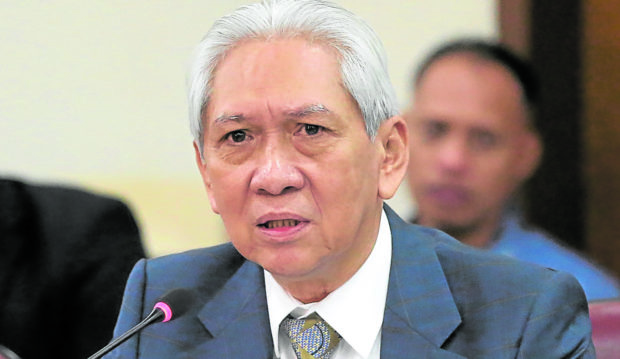Ombudsman pushes own bill to penalize SALN comments
MANILA, Philippines — Ombudsman Samuel Martires is pushing his proposed amendments to the Code of Conduct and Ethical Standards for Public Officials and Employees, which include jail time of five years for anyone who would issue “further commentaries” on the statements of assets, liabilities, and net worth (SALNs) required of those in the government.
“Such use by news and communications media shall be strictly limited to reporting of facts provided in the statement, and no further commentaries could be made thereon,” Martires said in a draft bill sent to the House of Representatives, a copy of which was obtained by the Inquirer.
Anyone violating this provision will be punished with imprisonment not exceeding five years or a fine not exceeding P5,000, or both, according to the draft bill.
In a statement on Tuesday, Martires claimed there was “no censorship [or] any restriction on the freedom of speech or expression to speak of” in his proposed bill.
He said his proposed amendments to Republic Act No. 6713 were “nothing more than an expansion, for purposes of clarity, of provisions already existing in the law.”
Article continues after this advertisementBut the National Union of Journalists of the Philippines (NUJP) reminded Martires that SALN reporting was “part of the press’ vital role in a democracy to seek transparency and accountability from government.”
Article continues after this advertisement‘Stringent penalties’
“As the Ombudsman, he should be the first to promote the spirit of transparency and accountability. Why is he the first to prevent us from doing such? What gives?” the NUJP said in a statement.
Martires first floated the idea of banning commentary on SALNs last Sept. 9, at the House hearing on the Office of the Ombudsman’s proposed budget for 2022
“What I’m proposing [are] stringent penalties that anyone who makes a comment on the SALN of a particular government official or employee must likewise be liable for at least imprisonment of not less than five years. No more, no less,” he told the lawmakers then.
Martires’ draft bill also proposes that the Office of the Executive Secretary be the repository agency of the SALNs of the president, vice president and all other national executive officials.
At present, it is the Office of the Ombudsman that performs that role.
“Each repository shall have the exclusive authority in approving any request for copying, reproduction, inspection, or any other form of access to such statements and shall enact reasonable conditions, guidelines, rules and regulations,” Martires said in his draft bill.
‘Broad and vague’
The House is still studying the draft measure, Deputy Minority Leader Carlos Zarate told the Inquirer in a text message on Tuesday.
But he promised to continue “to protect the interest of our people, especially on their right to access to information, right to free expression, etc., and, also in the spirit of transparency.”
“Penalizing or jailing a media person for merely expressing an opinion or comment on the SALN of a government official or employee is certainly very harsh, and may even constitute an undue curtailment of a constitutionally guaranteed right,” Zarate said.
“This is more so since the phrase ‘no further commentaries could be made’ is very broad and vague,” he said.
Martires worked on limiting access to SALNs early on. In September 2020, he issued Memorandum Circular No. 1 which restricted the public release of SALNs.
He said SALNs could be released only if the request was made by the government official who filed it or his/her official representative; if it was legally ordered by the court in relation to a pending case; and if it is made through the Office of the Ombudsman’s field investigation office for the purpose of a fact-finding probe.
Transparency
Under Section 8, paragraph D of RA 6713, the use of SALNs for commercial purposes is prohibited, except for “news and communications media for dissemination to the general public.”
In his Tuesday statement, responding to an Oct. 16 article of the Philippine Center for Investigative Journalism that reported opposition to his proposed amendments to the law, Martires said: “For transparency, the Ombudsman supports the publication of the SALN for informational purposes and factual reportage subject to existing rules and regulations.”
But he said the penal provision in his draft bill only “re-echoes what can already be found in Section 11” of RA 6713.
Martires also pointed out that the draft bill “is still subject to scrutiny, refinement and deliberation by the House of Representatives as a law-making body.”
‘Media repression’
Many media advocates see the proposed amendments as part of the Ombudsman’s moves to further restrict access to SALNs and, now, even the method by which these are reported to the public.
Martires earlier voiced a belief that reporting on SALNs had become akin to a smear campaign against public officials.
According to University of the Philippines journalism professor Danilo Arao, Martires’ draft bill promotes a kind of journalism that “defeats the purpose of in-depth reportage where ‘further commentaries’ are absolutely necessary in providing context.”
Arao said the draft bill “exacerbates the media repression being perpetuated by the Duterte administration.”
“It also reflects wanton ignorance of a principle of journalism called truth-telling, which is essentially a combination of factual and contextual accuracy,” he said.
The NUJP said the proposed amendments to RA 6713 only made transparency “almost a token act, given the Ombudsman’s apparent hesitation to conduct lifestyle checks and other investigations.”
“Threatening penalties for the vague proposed offense of making ‘further commentaries’ on government officials’ wealth declarations leaves accountability to the whims of a government agency and could reduce us to just stenographers of what politicians say they are worth,” it said. INQ
